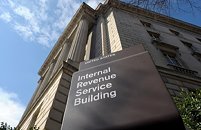Monday, February 26th 2018
"Lawyering Up" - Coinbase to Send Data on 13,000 Users to the IRS
Coinbase, one of the world's largest cryptoexchanges - which is also one of those with the most solid footing when it comes to these kind of exchange - has announced via email that it will be disclosing around 13,000 users' data to the IRS. No doubt this is a move by the company to improve its footing even more with state institutions; however, this will certainly reduce consumers' trust in the exchange - at least, for those customers who weren't considering having to pay taxes on their crypto earnings.
What prompted this move by Coinbase? Well, back in November 2016, the IRS, through a San Francisco-based judge, started court proceedings which would see all of Coinbase users' data to be delivered to the services. Coinbase fought over these court proceedings, but ultimately caved in after the IRS's proposal changed from "all users" to a system that's likely based on trading volume. This is why "only" 13,000 users will see their personal data (taxpayer ID, name, birth date, address, and historical transaction records for certain higher-transacting customers during the 2013-2015 period) being delivered to the IRS as part of a major tax evasion investigation (which should surprise no one, really).The affected individuals have been notified via email; Coinbase's statement as to this turn of events? They themselves are "unable to provide legal or tax advice," and thus, tell users that "If you have concerns about this, we encourage you to seek legal advice from an attorney promptly. Coinbase expects to produce the information covered by the court's order within 21 days."
Source:
ArsTechnica
What prompted this move by Coinbase? Well, back in November 2016, the IRS, through a San Francisco-based judge, started court proceedings which would see all of Coinbase users' data to be delivered to the services. Coinbase fought over these court proceedings, but ultimately caved in after the IRS's proposal changed from "all users" to a system that's likely based on trading volume. This is why "only" 13,000 users will see their personal data (taxpayer ID, name, birth date, address, and historical transaction records for certain higher-transacting customers during the 2013-2015 period) being delivered to the IRS as part of a major tax evasion investigation (which should surprise no one, really).The affected individuals have been notified via email; Coinbase's statement as to this turn of events? They themselves are "unable to provide legal or tax advice," and thus, tell users that "If you have concerns about this, we encourage you to seek legal advice from an attorney promptly. Coinbase expects to produce the information covered by the court's order within 21 days."




63 Comments on "Lawyering Up" - Coinbase to Send Data on 13,000 Users to the IRS
You seem to be misunderstanding my statement. That does not make it a lie. You don't automatically consume more power just because you mine, in my case my miner only draws 500W of my household power, or about 10 light bulbs worth. The core 2 quad drew more, and I still have an active gaming system that draws more under load. Sorry, but that's just how it is.
Here is my statement, live. I started mining in early/mid december. Note the slight downward trend despite the weather getting colder here in Washington:
I'll ask him later. :)
He stopped using some server computer he was using that drew many watts of power. He started mining with 2 1080s the draw less than the server he was using. He saw a small power draw decrease on his power bill statement.
END OF STORY.
To me, anyone that uses "triggered" or "the internet went crazy/broke the internet" or "salty", to me has less than average IQ or failed English classes. I don't tend to believe them.
I get what you are saying but words like that are practically mainstream now.
From one side it should look positive for the market, theoretically prevent pump and dump schemes, reduce volatility, maybe give more confidence to institutions and encourage adoption.
On the other side, for the average person it's annoying because it's more hassle to do, it discourage smarter decision making, not everyone is honest and wanna care about it, the government takes their cut as well, but it is what it is.
I wouldn't complain if the system was fair and automatic, so you don't need to run around doing paper work, hire accountants and lawyers, and hope everyone else doing the same. So we'll see what happens.